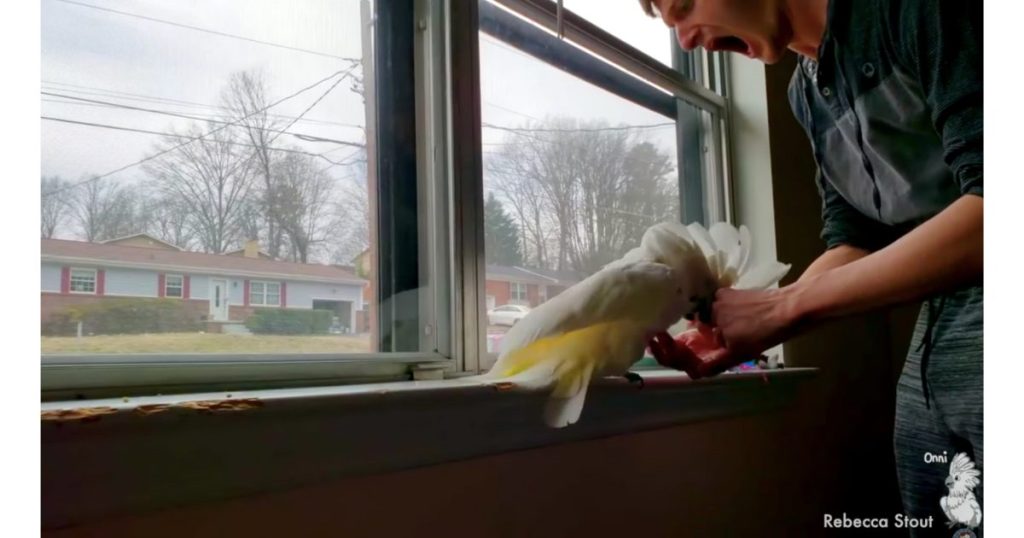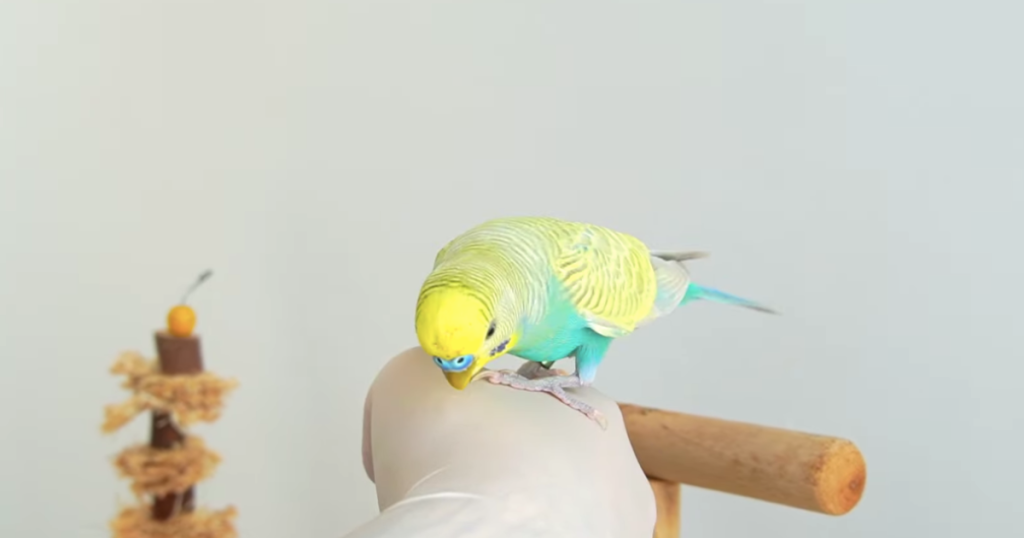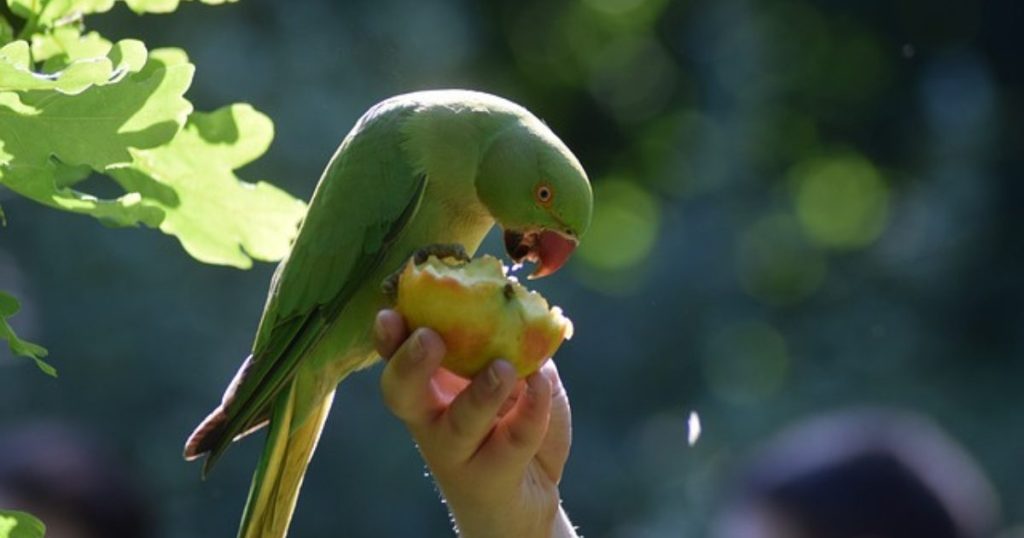If your bird is displaying aggressive behavior or biting you, then continue reading. Birds are not mean. There is no such thing as mean birds, and birds in the wild do not bite each other when they are fighting, so biting as a form of attack is a response to external factors and not inherent aggressiveness, but there’s good news, the good news is that these issues can be resolved with consistency training and spending time with your bird.
So we go through some facts about birds aggressive behaviors, why they happen, and how we can fix them.
Why do birds bite in the first place?
Birds bite you for a number of reasons,
- exploring things in their environment
- as the third leg to climb up things
- as a way of communicating, especially with us
- Out of fear of protecting what is theirs, whether it be their cage, food, toys, or the person they like or see as their mate.
- Out of curiosity, young birds will bite new things and explore what it is, so your fingers and hands could be something they aren’t used to yet, and it could be something that they’re still trying to figure out.
- Hormones, Birds bite a bit more when they are hormonal, usually during the warmer months or breeding season.
- If your bird is fearful and you’re forcing it to do something it doesn’t want to do, it will bite you because it likely can’t fly to escape and will attack as self-defense and as a last resort.
- Learned behaviour, birds will also bite because it’s a learned behaviour that you may have accidentally taught them. Parrots can bite you if you try to remove them when they’re having fun, playing, or while on the top of the cage, or someone’s shoulder will get you to stop and leave them alone.
- If you use your hands to punish your bird, it will become defensive almost every time you approach it with your hands.
- When you don’t pay attention to your bird’s body language or if you repeatedly force your bird to do things, you’re inadvertently teaching a bird that they have to bite you to get you to stop.
- You’re not confident enough. One of the main reasons your bird may bite you could be that you’re not confident enough when approaching it. If your hands are shaky or you’re showing that you’re afraid to get bitting by doing this, then your bird will sense it, and this will get you bitten in no time.
- Trauma, if you adopted a bird or you re-homed an older bird, then they might have previous trauma and may have been mistreated or neglected by their previous owner. Abandonment is one of the leading causes of trauma, and birds are very intelligent and form tight bonds with those who show them love and care. Being handed down from owner to owner and losing contact with the people they care about can be very traumatic for our birdies.
These are just the general reasons why your bird would bite so to understand why they bite you, you have to pay attention to what you’re specifically doing to cause them to bite.
Tip to get your bird to stop biting you:
Ignore, don’t react:
The most recommended way of handling a biting bird is to simply ignore it. We all know that it can be very painful when your bird bites, especially if it’s a big one, but experts still suggest that when a bird bites, the owner should not react at all, try your hardest not to make a sound or to pull your hand or even to shake the bite off.

If you react so, you may be giving the bird the reaction it was looking for, your bird bites you every time because it knows it hurts, and that’s what keeps you away, so the best way to prevent future bites is just to show your bird that its bites don’t affect you.
Use protection:
If you can’t control yourself from not reacting to a bite or if your bird is a big one and can cause some serious damage with its beak, you should think of using protection while handling it instead of using your finger as a purge for your biting bird tries to use an actual perch, that way your bird won’t be able to bite you.

And you can also try to use gloves, whatever ones you have. Only use the gloves for perching your bird and not for grabbing or holding it because your bird will hate you for that.
Distract it:
If you know your bird is about to bite, you can try to distract it by offering it a treat or a toy. The trick here is to provide distractions, and your bird will forget that it even wanted to bite you in the first place, and that will also cheer it up and make it less aggressive towards you.

It is very important to make sure that you are providing a treat before it bites you and not after; otherwise, your bird might think it’s being rewarded for biting. Don’t forget that every bird has its own personality, and some can be less friendly or hormonal, which may result in biting.
Form a positive relationship or bond with your bird:
Forming a relationship with your bird is the foundation for having and building trust with your bird and knowing your bird’s personality and quirks, wants, and needs.
Understanding their body language and viewing your bird as a friend or a companions rather than pets are all really important factors in understanding the reason your bird bites.
To avoid getting bitten, if you don’t have a good relationship with your bird, it’ll be harder for you to understand why they bite you. When they do, to build a good relationship with your bird, you need to spend time bonding with your bird by including them in your daily activities. You can provide them with lots of mental stimulation through training, forging, and having a variety of toys.
Building a relationship with your bird takes time, so don’t expect it to bond with you right away if you just got your bird, and part of forming a good relationship with your bird is learning to respect your bird’s space and boundaries.
Not forcing your bird to do things:
A lot of people have that mindset to dominate their birds, to force them to do things they want, and the important thing to remember is that birds will not do things they don’t want to do.
If you repeatedly force your bird to do things, you’ll eventually get bit, so if you’re guilty of this, change your mindset and think of your bird as your friend. You wouldn’t want to force your friend to do things for you right, instead of forcing your bird, ask them, wait for their response and give them a chance to think on their own and make a decision because you have to remember that parents are intelligent animals.
Observe their body language and behavior:
When you’re asking them to do things learning how to read or understand
parrot body language and behavior are key to avoiding getting bit because that is their way of communicating their feelings with you.
Suppose you’re not familiar with parrot body language and behavior. In that case, you’ll miss the really important signs of when your bird is repeatedly trying to tell you and warn you that you are overstepping a boundary, biting you will be their last way of getting their message across.
Some notable behavior,
Signs of oncoming aggression include
- raising their head feathers
- fading out tail feathers
- open beaks
- growling
Signs of fear include
- widening of the eyes
- feathers slick against their body
- physically moving their body away from you
Sometimes the way your bird responds to you will be subtle, and you might miss it, so pay close attention. If your bird seems aggressive or fearful, that’s your sign of backing off and giving your bird some space.
Use positive reinforcement:
If you need your bird to do something that instant, like going back inside the cage, instead of scooping your bird up forcefully and risking getting bit, lure them into the cage with a treat. You could put your bird’s favorite treat into their food bowl and have them go in on their own, or turn it into a fun activity or training exercise.
You could spin or wave hello just before asking them to go into the cage and onto a specific perch before handing them a treat, it’s really fun and engaging for them, and it makes them look forward to going back inside their cage.
If you don’t have a great relationship with your bird, have some treats with you at all times, keep them in your pockets, and every time you approach a bird, give them a treat. Your bird will eventually associate you with good things.
You don’t always have to give them a treat. It could be anything that your bird really likes, like their favorite toy, scritches, or even cuddles.
Don’t blame your bird for biting you:
Start looking at and thinking of your actions before and after your bird bites you. The reason may be something that you will be guilty of. Something you’ve done may be scared or angered your bird that caused them to bite you, so you put them back in their cage and missed spending some quality time with your bird, so they bit you to get your attention. You must remember that birds will bite for a reason, so take responsibility and take a deeper look at your actions. You’ll start to realize that every time bird ends up biting, if you do something, avoid doing that action in the future and think of a workaround.
Be like a bird and think like a bird:
This tip won’t teach your bird to stop biting you. Instead, it will teach them not to bite so hard and to use less pressure. You’ve probably heard of the shake your hand method
blowing on their face or putting them back in the cage for a quick time out,
and I’ve tried these methods myself, and sure these methods might stop your birds from biting you in that instance, but it doesn’t teach them not to bite.
If your bird is on your hand and is being nippy, scream right when they bite you and then put them down and walk away,
now only try this if you already have a bond with your bird because your bird will notice that the fun stops, and you will leave whenever they bite too hard; that’s why it’s really important to take the time to develop a good relationship with your bird first, before doing this, otherwise if your bird doesn’t like you then you’re only teaching it that biting you will make you go away and with training, it will take lots and lots of patience and repetition so be consistent if you’re going to try this method.
Consider your bird’s health and their environment:
Birds may lash out if they’re not feeling so well, so if you notice any
signs that your bird is sick, like if they’ve lost some weight if their poop looks a little different, or they don’t seem like themselves, then go to your avian vet to rule out any underlying illnesses,
To know more about bird illness, click here,
Your bird’s environment could also affect their behavior, so check if your bird’s cage is clean, see if you’re providing enough enrichment in their daily routine and if your bird is getting an adequate amount of sleep, especially when they’re becoming more hormonal.
In all seven of these tips on how to stop your bird from biting you, the key takeaway is to establish a good relationship with your bird by making sure that they have an enriching environment and, more importantly, be able to read its body language and understand when they tell you to back off, so you avoid getting a bit.
All images and videos sourced by https://www.youtube.com/@Flying Fids